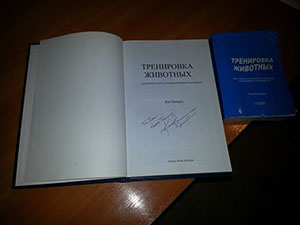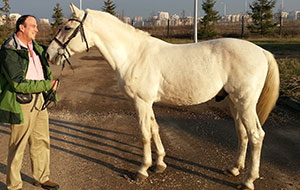I thought I would share a few highlights from my recent Russian adventure.

Right after ClickerExpo Europe, I flew from the UK to Russia where I spent two full weeks consulting. I did a series of seminars for trainers from at least 10 different zoos and aquariums. It was an interesting experience as my translator stood next to me for the full seminar—I would say a sentence, then he would translate that sentence, and that continued all day every day for each seminar. I was surprised by how quickly we got into a rhythm and the seminars began to flow well. The Russian trainers were an eager audience, and I was amazed to find that I had a very odd celebrity status over there.
A book with no boundaries

Two Russian editions of Ken's book:
St. Petersburg version (l)
and Moscow version (r)
Much to my surprise, my book Animal Training: Successful Animal Management through Positive Reinforcement was everywhere—and it was in Russian! There were probably more copies of my book in Russia than in any country I have ever visited, possibly because it is available there through two different publishers. Interestingly, these two Russian editions are not sanctioned versions of the book; my US publisher and I had no idea there were two Russian editions in circulation. I have been working for many years with translators in France, Japan, and Mexico, and it has been a massively difficult undertaking, so I was surprised to find my book had already been translated into Russian, twice! Just the fact that it is available so widely in Russia was amazing to me. There was the St. Petersburg edition, which is a handsomely bound leather version of the book that is even larger than the English version; the Moscow edition is divided into three large paperback volumes. Every professional trainer in Russia seems to have the book (and I am not using hyperbole). It is crazy how many people have one of the two Russian editions. The Russian trainers claimed that I am one of the most famous trainers in Russia! Who knew?
The same challenge world-over
It was interesting for me to see that trainers are the same all over the world. I met and watched some of the best exotic animal trainers I have ever seen. Yet, despite their skill and accomplishment, their most common question was, “How do I train my dog?” We all tend to be very species- (or breed-) focused and often have difficulty understanding how to translate our knowledge to a different type of animal.
Grasping the power of relationships

Ken with training staff
at aquarium in Naberexhnye Chelny
Perhaps one of the most difficult things for me during this consulting trip was trying to meet the Russians’ desire for a serious critique of their training. They would have me watch a training session or show, then the entire staff would gather together as the supervisor asked, “Tell us, what did we do wrong?” I would make a few suggestions, and often found myself wanting to compliment them on some amazing behavior they had trained. Invariably their response to the compliment would be a dismissive, “Well, I learned it from your book” or “I just followed the instructions in your book.” Sometimes I would be so blown away by a specific behavior that I would have to ask, “Show me where in my book you learned THAT!”
On the whole, the Russians proved to be a very skilled and disciplined group—which goes a long way in making much of their training so clean and precise. I think the thing that was new to them, or that they didn’t quite understand, was the power and importance of relationships in training. They recognized that relationships existed, but that fact was just not logical enough for them to embrace relationships completely as a useful tool at first. During each seminar I spent an entire day focused on non-food reinforcers and demonstrated how relationships fit into making those reinforcers more successful—a topic I have been teaching at ClickerExpo for many years (a Lab version will be offered at ClickerExpo 2015 in both Portland and Dearborn/Detroit as well). It was great to see the light bulb go off in their heads, as some of these concepts were the most new and transformative for them.
Russian reinforcement for Ken
The Russian language is new to me, but when I travel anywhere I try to learn a few basic words. I went to the first seminar in my first city and started by saying good morning in Russian. Up until that point the attendees had been quiet and reserved, but after just two Russian words out of my mouth they all came to life, applauded, and cheered. So on day two, I learned a new phrase and in Russian I said, “Good morning! Welcome back!” The trainers were even more appreciative than the first day. Finally, on the third day, I practiced for several hours and started the seminar by saying in Russian, “Good morning! Today I will present the seminar entirely in Russian.” I got a standing ovation and even when I admitted that I really couldn’t do that, and I didn’t think they would want me to try, they laughed and applauded their approval yet again. It wasn’t until later that I realized how powerful that small positive reinforcement experience had been. They weren’t collectively trying to get me to speak more Russian; they were just genuinely pleased that I tried. But I was so thrilled by their reaction that I was really motivated to keep learning more! Despite the fact that I know positive reinforcement is powerful, I still marvel when I see it occur so naturally and work so well!

Ken greeting a Russian Orlov Trotter,
the oldest and most popular "stud" breed
in Russia
Horse husbandry, and more autographs
Something that I wasn’t planning was a trip to the Kazan Hippodrome—a fabled and magnificent horse racing track, equestrian center, and museum in the heart of the Republic of Tatarstan. My hosts insisted that I go and that the trainers there would love to meet me. I explained that horse trainers don’t really follow my style of training in most cases, and certainly not at a horse track. But they persisted and took me anyway.
I was so glad that I did go! The track was the most modern and advanced animal facility I had seen so far in Russia. Hundreds of horses were housed there in the most modern, heated, and spacious stables I had ever experienced. There was a state-of-the-art hospital and, compared to everything else I had seen related to animal care in Russia, this was the height of luxury.
No fewer than a dozen Russian horse trainers greeted me eagerly and showed me around their facility. They pulled out copies of my book for me to sign—and I felt compelled to ask if they actually used this book to guide them in training horses. They shook their heads “yes” vigorously and I asked, “Really? To train them for equestrian events and horse racing?” They laughed and said emphatically, “NO!” I inquired, “Well then how do you use my book?” One of them opened my book to the chapter on husbandry training and smiled while giving me a big thumbs-up! They then led me to the hospital where they introduced me to several Orlov horses (a Russian breed). The trainers demonstrated how the horses were trained with positive reinforcement for positioning for x-rays, for foot care, for baths and grooming—all using a whistle and treats. I commented on how wonderful what they were showing me was, and their response (just like the zoo trainers I had met) was “Well, we learned it from you!” I was speechless and my eyes welled up with tears. They became very concerned that they had done something wrong. My translator stepped in and explained that they were good tears, “like when you eat good Russian mustard!”
Onward to spread the positive message
Well, I could tell all sorts of stories about Russian food (like the very spicy Russian mustard), travel adventures on Russian airlines, or the awful experience I had trying to drink fermented horses milk, but perhaps I will save those stories for another time. Each time I travel to a new place it renews my conviction that spreading the word about positive reinforcement training is important, and that helping people learn to train better is a worthwhile and important endeavor. There will always be new people to teach and new things to learn—that’s what keeps me traveling. I learned a great deal during my trip and can’t thank the trainers and my hosts enough for their wonderful hospitality. I am not sure if it was life imitating art, but I was tickled that they signed their cards and notes with the words, “From Russia with Love.”
Happy Training,
Ken



Post new comment